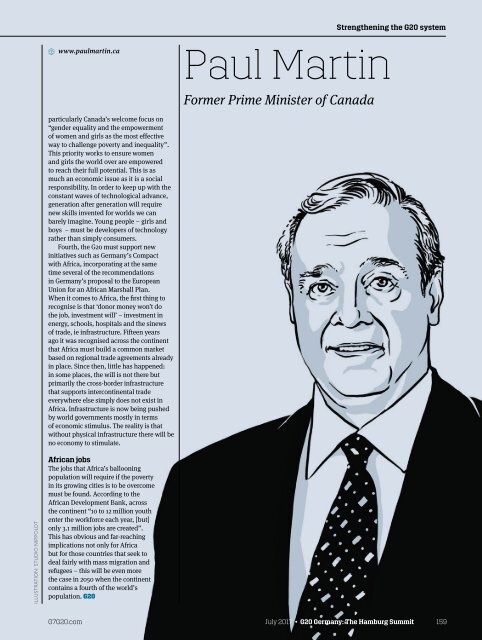G20-Germany-Hamburg-2017
mo.rami@trmg.co.uk
mo.rami@trmg.co.uk
You also want an ePaper? Increase the reach of your titles
YUMPU automatically turns print PDFs into web optimized ePapers that Google loves.
Strengthening the <strong>G20</strong> system<br />
www.paulmartin.ca<br />
Paul Martin<br />
Former Prime Minister of Canada<br />
particularly Canada’s welcome focus on<br />
“gender equality and the empowerment<br />
of women and girls as the most effective<br />
way to challenge poverty and inequality”.<br />
This priority works to ensure women<br />
and girls the world over are empowered<br />
to reach their full potential. This is as<br />
much an economic issue as it is a social<br />
responsibility. In order to keep up with the<br />
constant waves of technological advance,<br />
generation after generation will require<br />
new skills invented for worlds we can<br />
barely imagine. Young people – girls and<br />
boys – must be developers of technology<br />
rather than simply consumers.<br />
Fourth, the <strong>G20</strong> must support new<br />
initiatives such as <strong>Germany</strong>’s Compact<br />
with Africa, incorporating at the same<br />
time several of the recommendations<br />
in <strong>Germany</strong>’s proposal to the European<br />
Union for an African Marshall Plan.<br />
When it comes to Africa, the first thing to<br />
recognise is that ‘donor money won’t do<br />
the job, investment will’ – investment in<br />
energy, schools, hospitals and the sinews<br />
of trade, ie infrastructure. Fifteen years<br />
ago it was recognised across the continent<br />
that Africa must build a common market<br />
based on regional trade agreements already<br />
in place. Since then, little has happened:<br />
in some places, the will is not there but<br />
primarily the cross-border infrastructure<br />
that supports intercontinental trade<br />
everywhere else simply does not exist in<br />
Africa. Infrastructure is now being pushed<br />
by world governments mostly in terms<br />
of economic stimulus. The reality is that<br />
without physical infrastructure there will be<br />
no economy to stimulate.<br />
ILLUSTRATION: STUDIO NIPPOLDT<br />
African jobs<br />
The jobs that Africa’s ballooning<br />
population will require if the poverty<br />
in its growing cities is to be overcome<br />
must be found. According to the<br />
African Development Bank, across<br />
the continent “10 to 12 million youth<br />
enter the workforce each year, [but]<br />
only 3.1 million jobs are created”.<br />
This has obvious and far-reaching<br />
implications not only for Africa<br />
but for those countries that seek to<br />
deal fairly with mass migration and<br />
refugees – this will be even more<br />
the case in 2050 when the continent<br />
contains a fourth of the world’s<br />
population. <strong>G20</strong><br />
G7<strong>G20</strong>.com July <strong>2017</strong> • <strong>G20</strong> <strong>Germany</strong>: The <strong>Hamburg</strong> Summit 159
















